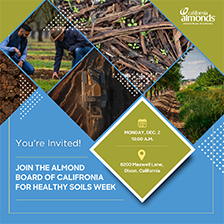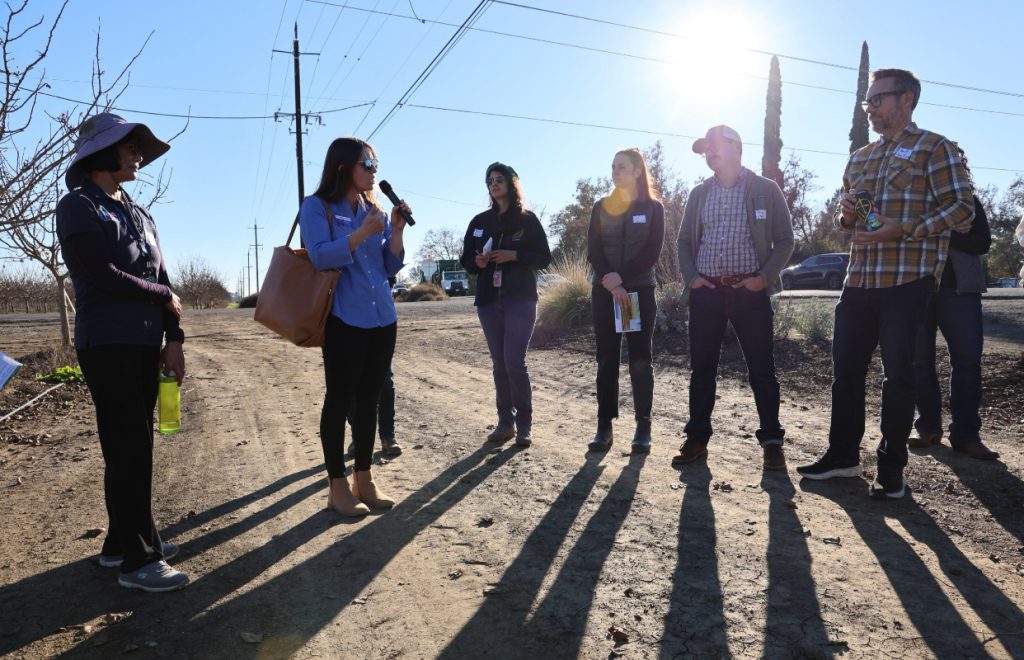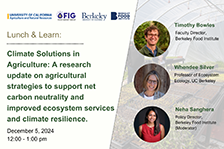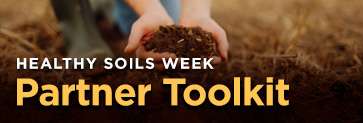Join the California Department of Food and Agriculture in celebrating Healthy Soils Week! Healthy soils support the sustainable production of nutritious food and fiber.
One perpetual challenge in farming is ensuring that the soil has the right nutrients to support robust crop growth. Our theme this year is A Circular Economy for Healthy Soils. Ever bought chicken manure from the nursery for your garden beds or picked up a load of compost from your local green waste facility? If so, you are participating in a circular economy and contributing to a more sustainable California. Promoting a circular economy in California can include opportunities to replace some commercially produced fertilizers with nutrients recycled from agriculture and municipalities. This cycle not only conserves resources but can often decrease costs or offer new revenue streams to those participating in the circular economy.
Why Healthy Soils?
Healthy soil is quite literally the foundation of sustainable food, water, air and biodiversity. Restoring and preserving healthy soil results in:
- Improved plant health and yields
- Increased water infiltration and retention
- Sequestered carbon and reduced greenhouse gases (GHGs)
- Reduced sediment erosion and dust
- Improved water and air quality
- Improved biological diversity and wildlife habitat
Events
Secretary Karen Ross kicks off Healthy Soils Week 2024
Join the California Department of Food and Agriculture in celebrating Healthy Soils Week! Healthy soils support the sustainable production of nutritious food and fiber. (5:46)
Monday, December 2nd

California Almonds
From orchard recycling to cover crops, farmers across the state are improving soil health. Join Secretary Karen Ross and the Almond Board of California for Healthy Soils Week! Attend this on-farm event to learn about the almond industry's environmental leadership, including healthy soil practices in California almond.
Location: 8200 Maxwell Lane, Dixon, CA 95620
Wednesday, December 4th
Wednesday, December 4 — 8:00 a.m. - 3:00 p.m.
Desert Organic Research and Food Safety Workshop,
University of California Cooperative Extension (UCANR)
Barbara Worth Country Club
2050 Country Club Drive
Holtville, CA 92250
Morning and afternoon sessions
8:00 am – 3:00 pm
Free event – lunch will be provided
This event will showcase cutting-edge research and practical organic farming strategies tailored to California's unique desert environment. The agenda covers insect pest management in low desert agriculture, summer cover crops for soil health and disease management, and more.

Farm Tour in Yolo County for State Legislative Staff and Stakeholders
From the Planting Seeds Blog
In honor of Healthy Soils Week (December 2 - 6), CDFA joined legislators, their staff members, and stakeholders for a tour of farms in Yolo County to see greenhouse gas-reducing healthy soil practices in action. Farmers who have received healthy soils grants from CDFA's Office of Environmental Farming and Innovation showed successful implementation of mulching and cover crop practices on adjacent farms and discussed their importance in improving soil structure, fertility, and water retention. The tour also included compost application and a well-established, low-maintenance hedgerow line — a thriving habitat for pollinator species.
Each farmer emphasized the critical support provided by the Healthy Soils Program, and how the funding enabled them to adopt these practices....
Thursday, December 5th
Thursday, December 5 — 12:00 p.m.
Webinar - Climate Solutions in Agriculture - Berkeley Food Institute
Join Berkeley Food Institute on World Soils Day (December 5th), for a conversation on soil, farming practices, carbon sequestration, and climate resilience. Dr. Whendee Silver will discuss recent findings on the potential of soil management practices, including compost, reduced tillage, and cover crops to contribute to California's goal to be net carbon neutral by 2045. Dr. Timothy Bowles will share strategies that farms can implement to increase beneficial ecosystem services and climate resilience, including highlighting the specific importance of soil biodiversity, and how state policies like the California Healthy Soils Program might best support these strategies.
Additional Informational Resources from our Partners

NRCS
Through voluntary conservation programs, NRCS helps producers, soil and water conservation districts, and other partners protect and conserve natural resources on private lands throughout the United States. With approximately 2,300 Service Centers in communities nationwide, NRCS and other USDA employees work side-by-side with producers in every State and territory.
NRCS Cropland In-Field Soil Health Assessment Overview: This diagnostic tool helps conservation planners determine if sol health resource concerns exist.
- NRCS Cropland In-Field Soil Health Assessment Overview, Part 1 (17:58)
- NRCS Cropland In-Field Soil Health Assessment Overview, Part 2 (16:35)
NRCS Rainfall Simulator Demo
The Rainfall Simulator provides a demonstration of how practices such as no-till farming, cover crops, and prescribed grazing benefit soil health and improve the water cycle on cropland and rangeland. Presented by Dr. Zahangir Kabir, NRCS Regional Soil Health Specialist. (10:29)

American Farmland Trust
American Farmland Trust is documenting economic and environmental benefits of soil health practices with farmer profiles, case studies, webinars, and on-farm soil analysis trials with almonds, mixed crops, wine grapes, and wheat.
Soil Health Farmer Profiles
American Farmland Trust's case studies in English and Spanish document how growers boosted their bottom line, increased their biodiversity, and reduced their water usage (in some cases by 40 percent) with various soil health practices.
Soil Health Bottom Line
To understand how soil health improves California producers' economic and environmental impacts, AFT offers case studies, farmer profiles, quantification tools, and other resources in its Soil Health Bottom Line program. Learn about the multi-year, in-field trials and how that information is shared with the agricultural community.
Learn More about the Soil Health Bottom Line.

Sustainable Conservation
Sustainable Conservation drives collaborative solutions to meet the water needs of California's environment, people, and economy for current and future generations – with particular focus on advancing sustainable groundwater management and accelerating the stewardship of natural and working lands and waterways.
Solutions in our Soils Webinar Series: This series brought together experts from across California for four rich and far-reaching conversations that covered what soil health means and why it's so important for increasing drought resilience, improving water quality, boosting biodiversity, and nourishing healthy farmlands and communities.
- In Conversation with Agroecologist, Author and Professor Liz Carlisle
- The Soil-Water Nexus
- Building Sustainable Supply Chains
- From Science to Practice
Cover Cropping in the SGMA Era
This collaboratively developed report offers a comprehensive overview of water impacts of cover cropping, the policy implications of those impacts, and recommendations for California's water managers. ulti-benefit practice can improve SGMA outcomes in water-scarce regions and the barriers that might hinder this potential.
Collaborative Solutions for California's Climate-Resilient Agriculture: Harnessing the Water-Related Benefits of Soil
This report looks at the relationship between healthy soils and water, and the barriers to soil health practices in California.
Healthy Soils Videos
Loading...
Loading...
CDFA's Healthy Soils Program
CDFA's Healthy Soils Program (HSP), launched in 2018, stems from the California Healthy Soils Initiative, a collaboration of state agencies and department promoting the development and conservation of healthy soils on California's working lands.
HSP funds research, demonstration, implementation and technical assistance grants to promote healthy soils practices. In 2024, Californians voted to fund Proposition 4, which gives HSP $65M for new grants. Keep an eye on the HSP webpage for updates on program structure and funding opportunities. You can also sign up for our newsletter to get updates as soon as they are available.
Want to read more about HSP? Visit our website. Want to stay up to date on HSP grant opportunities? Sign up for our mailing list.
Infographics

Healthier Soils, Healthier Water
Enlarge or print this infographic highlighting the connection between soil and water.
Illustration: SayoStudio.

Healthier Soils, The Compost-Carbon-Climate Connection
Enlarge or print this infographic explaining the connection between compost, carbon and the climate.



